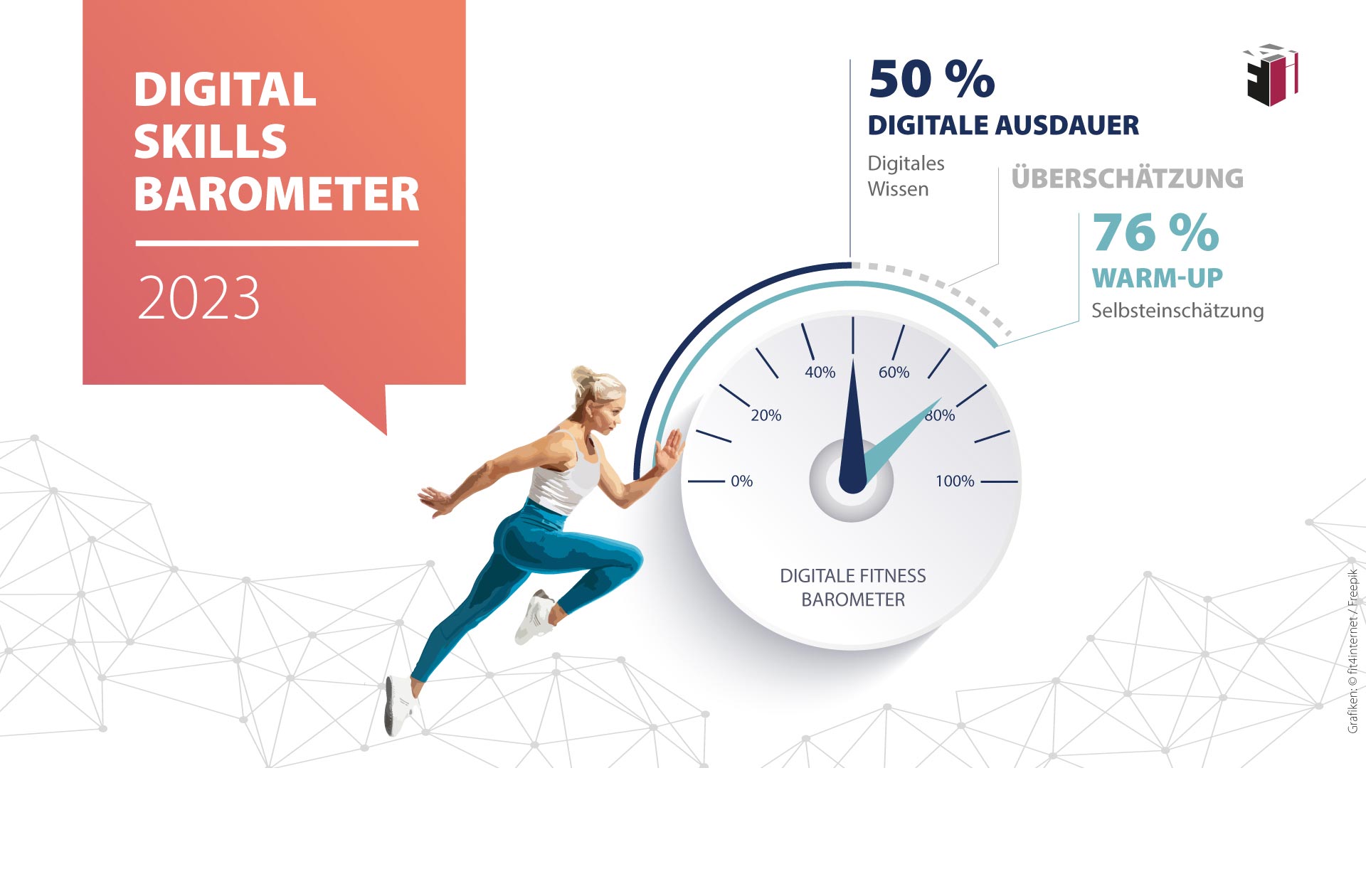Facts & Figures
Since 2022, the state of Austria's "digital fitness" has been measured in a unique way using the Digital Skills Barometer.
The Digital Skills Barometer is the first representative survey of digital skills in Austria based on the DigComp AT skills framework. It combines self-assessment, digital literacy, technology affinity and questions on key digital issues to identify the most important levers for increasing digital skills. The result of the Digital Skills Barometer is a detailed picture of the level of digitalisation of the Austrian population and forms the basis for the next steps in skills development.
The first survey was conducted in April and May 2022 with a sample of almost 4,000 people living in Austria, stratified by gender, age and federal state. The "Digital Skills Barometer 2023" survey was conducted from May to July with almost 3,700 people, and the latest results were published in November 2023. The comprehensive report of the Digital Skills Barometer 2023/2024 is divided into three content sections, which are being published sequentially and are available here. Morevoer, a special edition on artificial intelligence was conducted in summer 2024, featuring an additional survey focusing on AI. Please note, the reports are currently only available in German.
- NEW: Mission 20:24 with conclusions and recommendations for decision-makers on digital skills development in Austria. Derived from the Digital Skills Barometer 2023/2024 and the special edition AI skills.
- DSB Special Edition - Artificial Intelligence: Are Austrians fit for AI? Find out everything about knowledge, use, challenges, fears, and opportunities in dealing with AI in the special edition of the Digital Skills Barometer 2024 - AI Competences.
- Part 1 to 4 of the Digital Skills Barometer 2023/2024 (DSB Report) with general results of the digital fitness in Austria, highlighting basics of digitalization, federal states, gender and much more.
- The results of the second "Digital Skills Barometer 2023" survey are available for download here.
- You can download the most important results of the study (2022) here (PDF).
- The full version of the study 2022 (PDF) is also available for download here (accessible version in preparation).
Highlights of the Digital Skills Barometer 2023
Austrians continue to overestimate their own abilities: The "digital endurance" (knowledge) of Austrians is at 50 points, while the "digital warm-up" (self-assessment) is at 76 points.
Problem solving, innovation and continuing learning are weak points: Competence area 5 shows the least knowledge and the most overestimation.
Increased expertise in safety: The knowledge gap in area 4 ('Safety and sustainable use of resources') has been significantly reduced compared to 2022, and has been developed positively.
There is still a gender gap: 60% of women are "digital laggards". There are correlations with their professional situation and interests.
Partners of fit4internet in the project 2023
Eviden Austria (2023), ETC, Federation of Austrian Industries, Austrian Federal Economic Chamber, Siemens, Spar Austria, Berufsförderungsinstitut Austria, Institute for Economic Promotion of the Austrian Economic Chambers
Highlights of the Digital Skills Barometer 2022
Digital fitness is overestimated. The results show that self-assessment questions or questions about usage habits are not sufficient to determine the actual digital skills of Austrians. Usually, people tend to overestimate their own digital fitness.
Practice is a prerequisite for digital performance. Just as in sports, it is not enough to engage with digital developments and applications only a few times. In order to build up a solid condition and stay fit, you need ongoing practice!
A high level of education makes you digitally fit. Formal education correlates with digital competence. The higher the formal educational qualification, the higher the digital fitness on average and the more realistic the self-assessment of one's own digital competences. People with a higher level of formal education recognise their knowledge gaps more easily and educate themselves more frequently on digital topics.
The gender gap requires attention. Women not only rate their digital competences lower than men, but they also achieve a lower level of fitness compared to men. At the same time, home office provision by employers is worse for women than for men. There are many arguments in favour of promoting women's digital competence through awareness raising, fitness training and equipment.
Austrians learn informally. According to the European Commission, digital competences are among the eight key competences for "lifelong learning", but only 10.4% of the population between 15 and 74 years of age participate in relevant courses or training on an annual average. Learning scenarios for the digital world tend to be informal: almost 70% of digital skills development takes place through learning by doing or internet platforms and forums.
Partners of fit4internet in the project 2022
Accenture, Federal Ministry of Finance, ETC, Federation of Austrian Industries, Austrian Federal Economic Chamber


